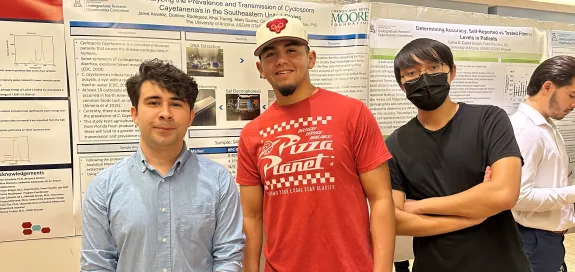
Investigating the Foodborne Parasite Cyclospora in Environmental Waters
Goals
The driving question of this project is to better understand the prevalence, transmission, and epidemiological traceback investigation of Cyclospora cayetanensis, a human foodborne and waterborne protozoan parasite that causes cyclosporiasis.
Issues Involved or Addressed
Cyclospora cayetanensis is a coccidian protozoan parasite causing cyclosporiasis, a diarrheal disease worldwide, associated with the consumption of fresh produce or water contaminated with the sporulated oocysts from the parasite. This parasite can only infect human hosts, with oocysts that have been sporulated in the environment within 1-14 days and then ingested. Fresh produce has been reported to be contaminated with C. cayetanensis in endemic areas of several countries and recently has been identified in produce grown in the USA. Foodborne outbreaks in the U.S. caused by C. cayetanensis associated with fresh produce have been recurring almost every year since 2000 (CDC). In 2021, two major multistate outbreaks were reported in the United States in which various people reported eating various types of leafy greens; the source of the outbreak was not identified. In total in 2021, there were 1,020 illnesses reported and 70 hospitalizations (CDC). In 2022 there were 1,129 illnesses and 74 hospitalizations, and 2023 has had 1,063 illnesses and 79 hospitalizations (CDC). A better understanding of the regional prevalence, occurrence, and how fresh produce becomes contaminated with Cyclospora is essential to prevent cyclosporiasis infections and outbreaks.
Methods and Tech
The Cyclospora project workflow includes sample collection, concentration, DNA extraction, purification, and molecular analysis by qPCR. Positive samples for C. cayetanensis are further analyzed with amplicon target sequencing on the Next Generation Sequencing platform Oxford Nanopore MinION. Sequences are analyzed on NCBI Gen Bank directly, using the University of Arizona High Performance Computing (HPC). This NGS is critical in providing secondary confirmation of Cyclospora-positive samples and for epidemiological traceback investigations to help solve and prevent fresh produce outbreaks.
Academic Majors of Interest
Open to all majors, with particular interest in students from microbiology, animal sciences, veterinary sciences, biology, molecular and cellular biology, public health, environmental sciences, and nutritional sciences disciplines.
Preferred Interests and Preparation
- Requires 9 hours/week in the laboratory
- No lab experience is necessary
- Eager to learn new laboratory methods
- Works well with peers and graduate students
- Willing to read literature to become familiar with research topic
- Will prepare and present poster and PowerPoint presentation
Application Process
Please email Dr. Lopez directly with interest in research experience and include a resume and cover letter.
If you need guidance on creating these items, please see the Resume, CV & Cover Letter page developed by Student Engagement and Career Development.

